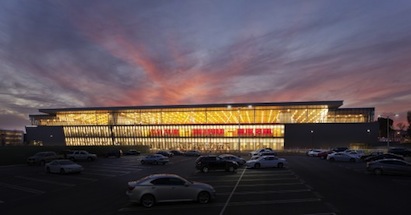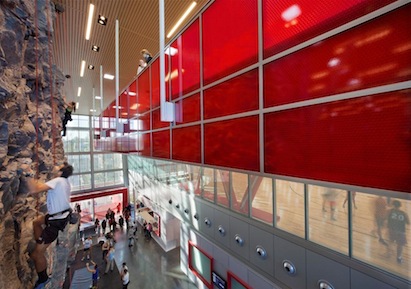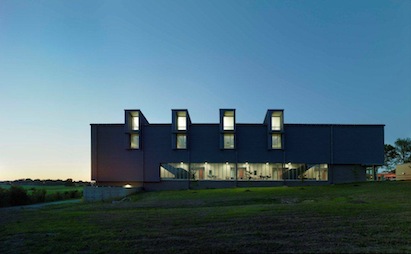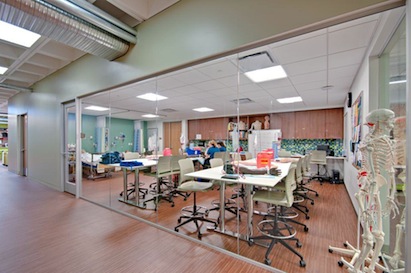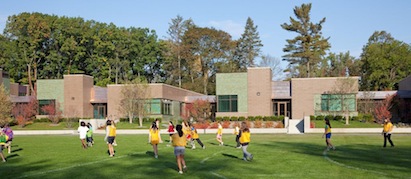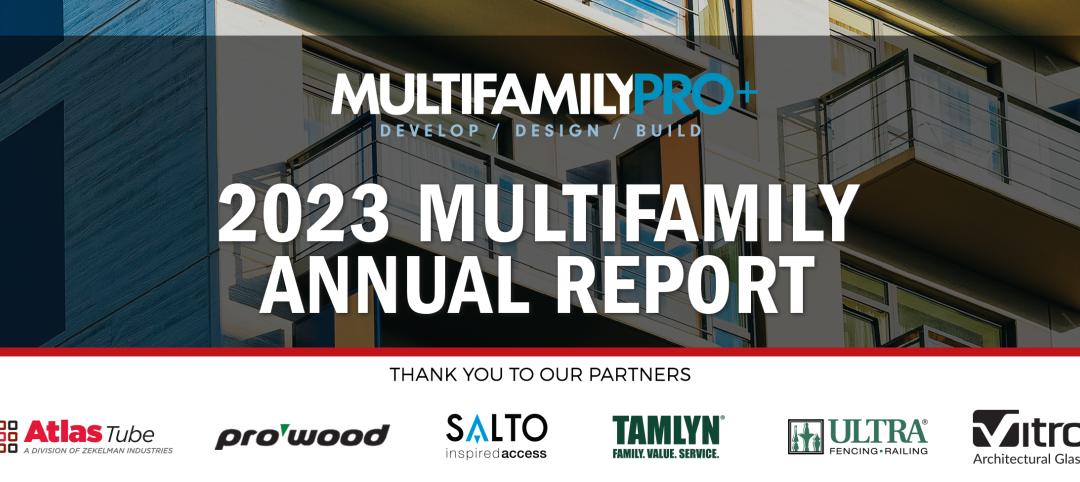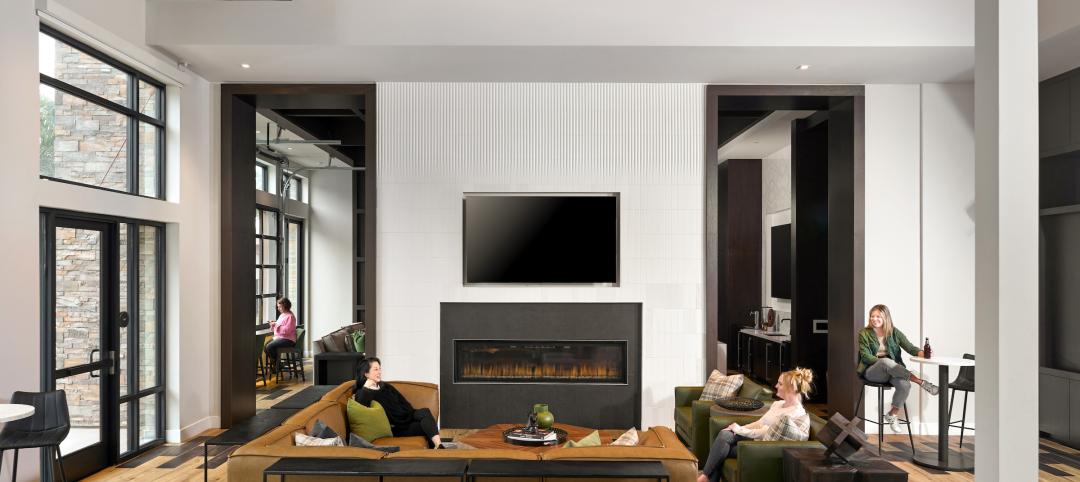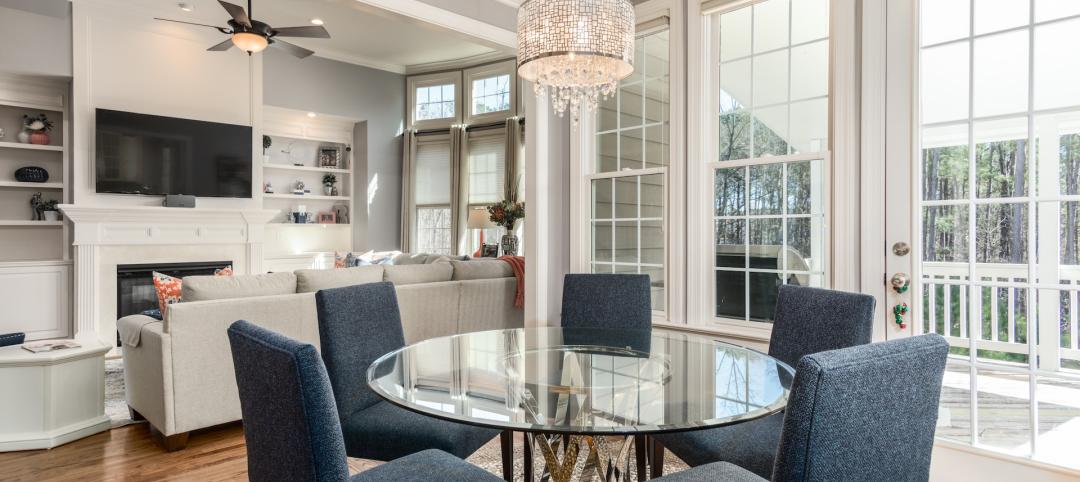Washington, D.C. – The American Institute of Architects (AIA) Committee on Architecture for Education (CAE) has selected five educational and cultural facilities for this year’s CAE Educational Facility Design Awards. The CAE Design Excellence Award honors educational facilities that the jury believes should serve as an example of a superb place in which to learn, furthering the client's mission, goals and educational program while demonstrating excellence in architectural design. These projects exemplify innovation through the client's educational goals through responsive and responsible programming, planning and design. Function and surrounding regional and community context are valued as part of the planning and design process.
California State University, Northridge Student Recreation Center; Northridge, California
LPA, Incorporated
The Student Recreation Center strategically creates a strong bookend to the east end of the campus, providing a dynamic, energetic approach to recreation. The design concept is clearly executed with a judicious use of colors and finishes. Upon entering the building natural lighting and material choices raise excitement and motivate movement. As an athletic building, it captures the energy and impetus of the various sporting activities inside. Strong transparency and interconnections between spaces inside the building are appealing, inviting and conducive to exercising. Compositionally it is assured and confident. Its community connection is highly apparent. Rainwater collection, natural ventilation, and day lighting are strong sustainable design features that are nicely integrated into the design. It was evident to the jury that students were involved in the conceptualization process and planning.
Sandy High School; Sandy, Oregon
Dull Olson Weekes – IBI Group Architects
Breathtakingly detailed as a public school, Sandy High School sets very high standards in terms of materials, finishes and aesthetics. Sitting lightly on the land, the building allows nature to penetrate the campus. It takes advantage of the hillside and creates panoramic views while nestling comfortably on the contours. Visible green roofs below adjacent classrooms add to hillside views while remaining roof areas are opportunities for power generation. Transparency between classrooms and common areas is executed boldly, with floor to ceiling glass suggesting a confidence with the user groups. Single loaded corridors were used to great effect by allowing natural light into both sides of learning spaces. Exterior treatments reflect the region in a wonderful and indigenous way and incorporate pleasant verandas with deep overhangs. The usable space per student and color combinations contribute to and promote student development.
Hinds Community College Jobie L. Martin Classroom Building; Jackson, Mississippi
Duvall Decker Architects
This simple and honest building with strong forms and an elegant façade shows that a few simple gestures can render a sense of identity to an otherwise nondescript campus. The rigorous use of materials, straightforward detailing, and clarity of concept elevates the modest program to a new level. The jury admired the light airy classrooms that combined the translucent, transparent, fixed, and operable glazing.
Mesa Community College Health Wellness Building; Mesa, Arizona
SmithGroupJJR
The transformation of this postindustrial concrete building into a light filled, translucent learning environment is exceptional. This project sets a high standard for reuse and repurposing of an existing building and demonstrates how constraints can benefit and strengthen a project. The conversion of leftover space between buildings creates dynamic and interactive circulation opportunities. The exterior is striking in its bold gestures, especially at night.
Cranbrook Kingswood Girls’ Middle School; Bloomfield Hills, Michigan
Lake|Flato Architects
This design integrates form and function in ways reminiscent of the Crow Island School. The building is indicative of an independent language that fits well within the campus context. Cranbrook Kingswood Girls' Middle School is beautifully detailed, appropriately contextual in a place where expectations are very high, modest in scale, yet intimate. The variety of shared common learning spaces connects directly to the exterior while providing opportunities to integrate imaginative ideas into the educational environment. The scale of the interstitial spaces and classrooms give a very secure feeling to the learning environment. This school builds on great traditions but creates a quality and life of its own.
Jury
The 2013 CAE Educational Facility Design Awards jury includes: Steven M. Shiver, AIA, Chair, NAC Architecture; John R. Dale, FAIA, Harley Ellis Devereaux; Linda Nelson Keane, AIA; Victor Sidy, AIA, Taliesin School of Architecture and C. Kenneth Tanner, University of Georgia.
About the Committee on Architecture for Education (CAE)
The CAE is a large and active group of architects and allied professionals concerned with the quality and design of all types of educational, cultural, and recreational facilities. While a large portion of CAE members practice in the K-12 and post-secondary education markets, they look to serve the needs of those in the entire pre-K to 99 markets. CAE identifies national educational facility issues critical to architects and works to strengthen relationships with allied organizations, client groups, and the public.
About The American Institute of Architects
Founded in 1857, members of the American Institute of Architects consistently work to create more valuable, healthy, secure, and sustainable buildings, neighborhoods, and communities. Through nearly 300 state and local chapters, the AIA advocates for public policies that promote economic vitality and public well being. Members adhere to a code of ethics and conduct to ensure the highest professional standards. The AIA provides members with tools and resources to assist them in their careers and business as well as engaging civic and government leaders, and the public to find solutions to pressing issues facing our communities, institutions, nation and world. Visit www.aia.org.
Related Stories
MFPRO+ Special Reports | Oct 27, 2023
Download the 2023 Multifamily Annual Report
Welcome to Building Design+Construction and Multifamily Pro+’s first Multifamily Annual Report. This 76-page special report is our first-ever “state of the state” update on the $110 billion multifamily housing construction sector.
Giants 400 | Oct 23, 2023
Top 190 Multifamily Architecture Firms for 2023
Humphreys and Partners, Gensler, Solomon Cordwell Buenz, Niles Bolton Associates, and AO top the ranking of the nation's largest multifamily housing sector architecture and architecture/engineering (AE) firms for 2023, as reported in Building Design+Construction's 2023 Giants 400 Report. Note: This ranking factors revenue for all multifamily buildings work, including apartments, condominiums, student housing facilities, and senior living facilities.
Affordable Housing | Oct 20, 2023
Cracking the code of affordable housing
Perkins Eastman's affordable housing projects show how designers can help to advance the conversation of affordable housing.
Senior Living Design | Oct 19, 2023
Senior living construction poised for steady recovery
Senior housing demand, as measured by the change in occupied units, continued to outpace new supply in the third quarter, according to NIC MAP Vision. It was the ninth consecutive quarter of growth with a net absorption gain. On the supply side, construction starts continued to be limited compared with pre-pandemic levels.
Warehouses | Oct 19, 2023
JLL report outlines 'tremendous potential' for multi-story warehouses
A new category of buildings, multi-story warehouses, is beginning to take hold in the U.S. and their potential is strong. A handful of such facilities, also called “urban logistics buildings” have been built over the past five years, notes a new report by JLL.
Building Materials | Oct 19, 2023
New white papers offer best choices in drywall, flooring, and insulation for embodied carbon and health impacts
“Embodied Carbon and Material Health in Insulation” and “Embodied Carbon and Material Health in Gypsum Drywall and Flooring,” by architecture and design firm Perkins&Will in partnership with the Healthy Building Network, advise on how to select the best low-carbon products with the least impact on human health.
Contractors | Oct 19, 2023
Crane Index indicates slowing private-sector construction
Private-sector construction in major North American cities is slowing, according to the latest RLB Crane Index. The number of tower cranes in use declined 10% since the first quarter of 2023. The index, compiled by consulting firm Rider Levett Bucknall (RLB), found that only two of 14 cities—Boston and Toronto—saw increased crane counts.
Office Buildings | Oct 19, 2023
Proportion of workforce based at home drops to lowest level since pandemic began
The proportion of the U.S. workforce working remotely has dropped considerably since the start of the Covid 19 pandemic, but office vacancy rates continue to rise. Fewer than 26% of households have someone who worked remotely at least one day a week, down sharply from 39% in early 2021, according to the latest Census Bureau Household Pulse Surveys.
Luxury Residential | Oct 18, 2023
One Chicago wins 2023 International Architecture Award
One Chicago, a two-tower luxury residential and mixed-use complex completed last year, has won the 2023 International Architecture Award. The project was led by JDL Development and designed in partnership between architecture firms Goettsch Partners and Hartshorne Plunkard Architecture.
Giants 400 | Oct 17, 2023
Top 130 Sports Facility Architecture Firms for 2023
Populous, Gensler, HOK, and HKS head BD+C's ranking of the nation's largest sports facility architecture and architecture/engineering (AE) firms for 2023, as reported in Building Design+Construction's 2023 Giants 400 Report.


